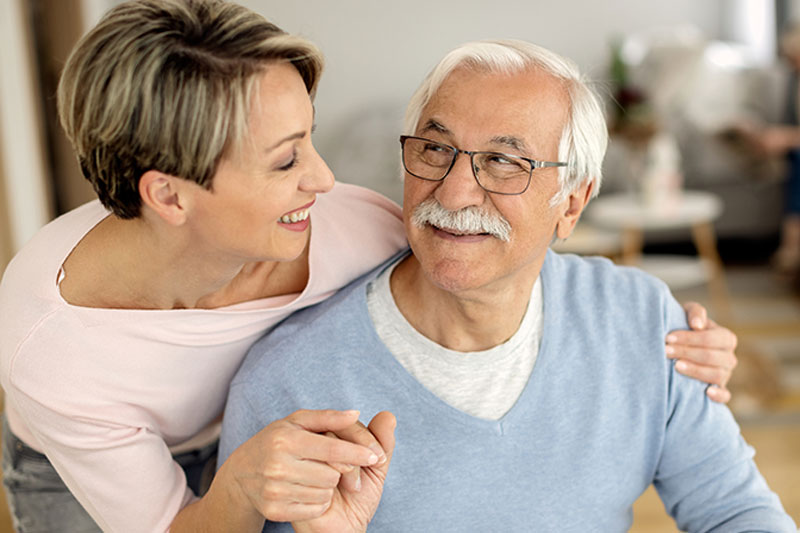
These middle stage Parkinson’s care tips help caregivers and seniors face new challenges.
A diagnosis of Parkinson’s affects family members as well as the person diagnosed. Understanding what to expect as the illness advances is key to being ready for the changes to come and to making life the best it can be each day.
In our three-part series on Parkinson’ care tips, we will be revealing what to expect in each phase of the disease. Blog topics will include what family caregivers can do to best help a senior with Parkinson’s, and how Live Free Home Health Care, one of the top senior care companies in Concord, NH and the surrounding areas, can assist. Read part one and part three of our series.
Middle Stage Parkinson’s
As Parkinson’s progresses into the middle stage, one of the top worries is diminished balance, and fall prevention will become important. Remember, however, that through the middle stage of the disease, the person with Parkinson’s often will still be able to fully participate in everyday activities like getting dressed, tending to personal hygiene, and eating. It’s important to allow additional time for the individual to finish these activities, however, as you begin to see a noticeable slowing in self-care abilities.
Other changes to watch for in this stage include:
- Increased stiffness, rigidity, and tremors
- Increased tiredness
- Changes to sleep patterns and other sleeping difficulties
- Constipation
- Communication issues, including slurring words and a lower and more hoarse tone of voice
The Effect of Middle Stage Parkinson’s on Family Caregivers
Even though the impact on caregiving duties has probably been minimal up until this point, care needs will advance in the middle stage of Parkinson’s. To further compound the complications, trouble with communicating may cause aggravation for the person with Parkinson’s and family care providers.
It’s common for caregivers to deal with increased anxiety, stress, and worry at this point in the illness. There may be concern over how to meet the continuously growing needs of the person they love. These feelings may be worsened by insufficient sleep and/or other important aspects of maintaining a healthy lifestyle. As is the case throughout the advancement of Parkinson’s, it’s very important for family caregivers to focus on taking care of themselves.
How Caregivers Can Help with Middle Stage Parkinson’s Care
One great way to help in this stage is to implement changes to the home environment to ensure both safety and ongoing independence. Even the most basic changes can make a positive impact. For example, try:
- Eliminating throw rugs, clutter, extension cords, and anything that may pose a tripping risk
- Installing handrails and grab bars in the bathroom
- Buying clothing and shoes that are easier for self-dressing, like shoes with Velcro instead of laces, pull-on trousers, shirts with snaps instead of buttons, etc.
- Replacing the person’s manual razor and toothbrush with electric versions
- Researching adaptive tools like knives that work with a rocking motion, utensils with bigger, easier-to-grasp handles, levered door handles to replace knobs, etc.
Live Free Home Health Care’s award-winning caregiving professionals are here to work with you through every stage of Parkinson’s. We are able to help you formulate a proactive plan of care that will make sure all needs are met now, and as they change in the future.
It’s important to understand that caregiving should not be a solo undertaking. Give us a call at 603-217-0149 for more Parkinson’s care tips or a no-cost in-home consultation to learn more about our in-home care services and how we can ease the transitions through Parkinson’s for both you and the senior you love.
